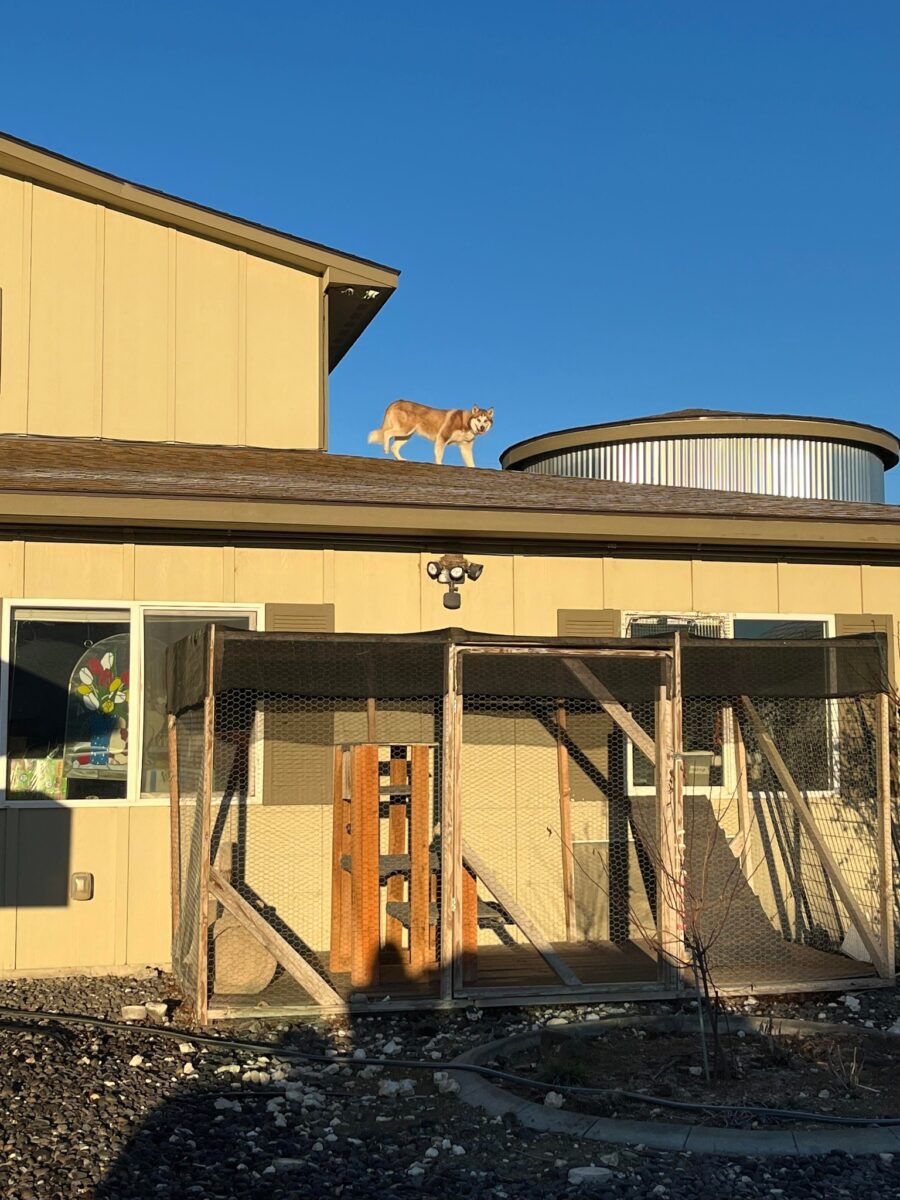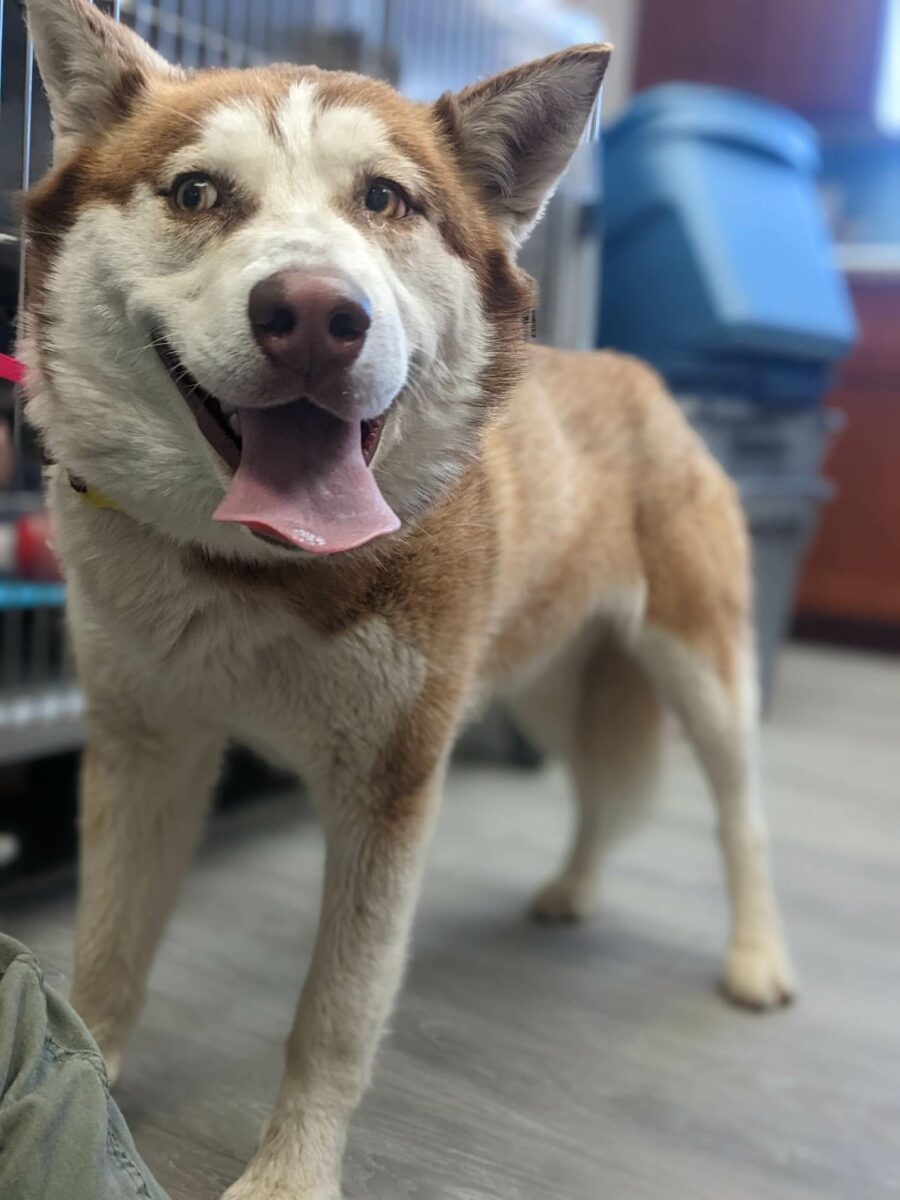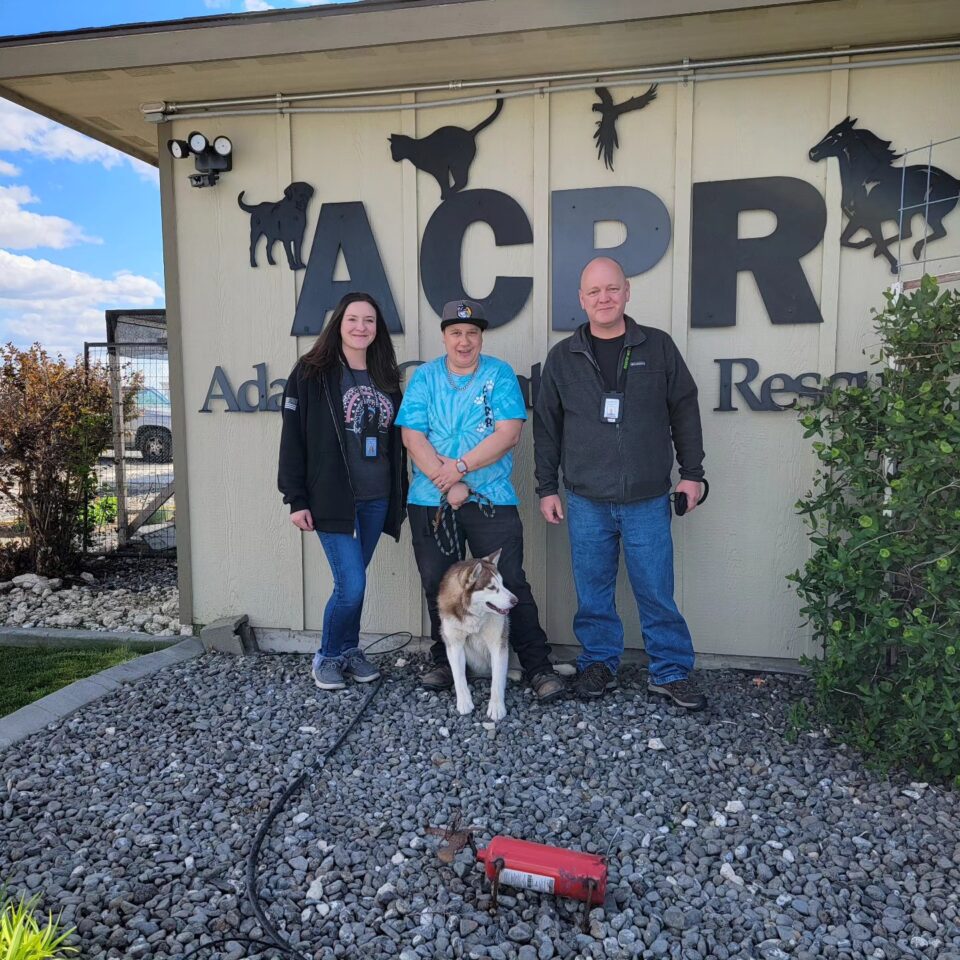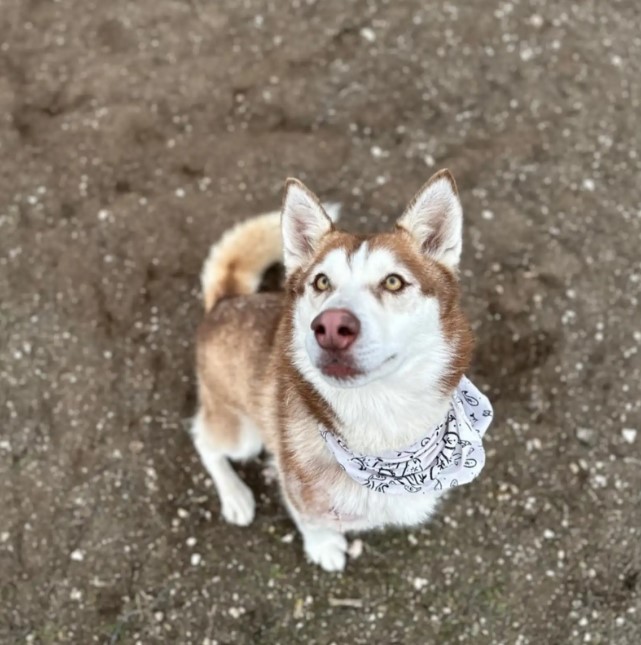All dogs dream of living in a happy home, surrounded by their parents who shower them with love.
While a Red Husky, later named Luna, was hopelessly roaming the streets in Othello, Washington, she kept thinking about the home she once had.
The pooch looked around and observed the passers-by in hopes of recognizing the familiar faces of her previous owners.
Luckily, the rescuers at Adams County Pet Rescue came across the pooch, and they took her under their care.
The canine was a real sweetheart, and the staffers were convinced that she had a family of her own at some point.
They kept hoping that her owners would claim her, but unfortunately, that didn’t happen.
The Pooch Tries To Escape The Shelter

Living in a kennel represented a drastic change for Luna. The shelter environment was too noisy for her.
The pup yearned to find her previous family and reunite with them.
Only ten days after arriving at the shelter, Luna ran away from her crate and climbed to the shelter’s roof.
“It’s happened again, except this time it’s a Husky on the roof! Maybe Luna’s climbing skills are the reason her owner decided not to pick her up,” Adams County Pet Rescue wrote in a Facebook post.
The pup stood on the roof and observed the area, hoping to catch a glimpse of her beloved family members.
As soon as the shelter staff noticed her, they rushed to rescue her, and they lured her back to safety.
Luna Receives A Lot Of Love

The wonderful staffers gave Luna a lot of love, which she missed.
They knew that her heart longed for a loving home, and they promised to help her find her happiness.
Luna hoped to attract the attention of the potential adopters who visited the shelter.
The pup finished training courses in the upcoming months. She got along wonderfully with the other shelter residents.
The more Luna started trusting her shelter friends, the more her personality shined.
The lovely girl kept waiting for someone to take her home, but sadly, nobody gave her a chance.
A year later, Luna became one of the shelter’s longest residents.
The staff loved her deeply, and they never stopped believing that one day, she would find a forever home. They knew that she would make a wonderful family member.
Enjoying A Sweet Foster Life

When the shelter established a fostering program together with the Ahtanum View Reentry Center in Yakima, sweet Luna was the first dog they chose.
The canine felt over the moon after she met the foster program’s coordinators and the rest of her foster family.
Luna stepped out of the Washington shelter with a smile on her face. The pup had been waiting for this moment for so long.
After she moved into her foster home, the lovely girl quickly captured the hearts of her fosters.

“She is seriously the [chillest] Husky I have ever seen, and I don’t know how she had been at the shelter for over a year. She is the biggest sweetheart, and everyone adores her,” Brianna wrote to Adams County Pet Rescue, later shared on Facebook.
Luna enjoys her life in her temporary home.
The pup loves napping on the floor with her legs against the wall and eating delicious treats her fosters give her.
The wonderful pup has a lot of love to give, and she often snuggles with her foster family.
I’m glad that Luna finally got a chance to relish life outside of the shelter. I hope that she will soon land the perfect home and find the true love she has been waiting for.
If you’ve noticed your furry friend constantly gnawing at their paws, you’re not alone. It’s a common behavior that many dog owners encounter and can be concerning. Your dog’s paw-chewing habit may leave you wondering about the underlying reasons behind this behavior. Understanding why your dog is chewing their paws can help address any potential issues they may be facing. So, let’s take a closer look at some possible explanations for this behavior and how you can help your pup find relief. Let’s explore together why your dog may be indulging in this paw-licking habit and what steps you can take to ensure their paws stay healthy and happy.
Understanding the Behavior: Why Is My Dog Chewing His Paws?
Identifying Normal vs. Excessive Paw Chewing
When it comes to your furry companion chewing on their paws, understanding the line between normal behavior and excessive chewing is crucial. Occasional paw licking or light chewing can be normal grooming behavior. However, persistent and intense chewing could indicate an underlying issue that needs attention.
Exploring the Psychology Behind Paw Chewing
Your dog’s paw chewing behavior can stem from various psychological factors. Stress, anxiety, boredom, or discomfort can drive a dog to chew on their paws as a coping mechanism. Identifying the root cause behind this behavior is key to addressing it effectively. Keep an eye on any triggers or patterns that may be contributing to your dog’s paw chewing habits.
Common Causes of Paw Chewing in Dogs
Allergies and Skin Conditions
If your furry friend can’t stop chewing on their paws, it could be due to allergies or skin conditions. Just like humans, dogs can have allergic reactions to various things like pollen, food, or even certain materials. These allergies can cause itchiness and discomfort in their paws, leading them to chew excessively to relieve the irritation.
Pain and Discomfort
Sometimes, paw chewing in dogs is a sign of underlying pain or discomfort. Your dog might be experiencing joint pain, a splinter, or an injury that’s causing them distress. Chewing on their paws can be a way for them to cope with the discomfort they’re feeling. If your dog is consistently chewing on their paws, it’s essential to have them checked by a veterinarian to rule out any potential pain-related issues.
Parasites and Infections
Parasites such as fleas, ticks, or mites can also be a reason why your dog is chewing on their paws. These tiny pests can cause intense itching and irritation, prompting your dog to chew on their paws to alleviate the discomfort. Infections, whether bacterial or fungal, can also lead to paw chewing behavior. Regular preventive measures and grooming can help in preventing such issues.
Boredom and Anxiety
Just like humans, dogs can experience boredom and anxiety. When left alone for extended periods or not receiving enough physical and mental stimulation, dogs may resort to chewing on their paws as a way to cope with their feelings of boredom or anxiety. Engaging your dog in regular play, exercise, and social interaction can help alleviate these emotional issues and reduce paw chewing behavior.
How to Address Paw Chewing
Veterinary Diagnosis and Treatment
If your dog is consistently chewing on their paws, it’s essential to consult a veterinarian. They can identify and treat underlying issues such as allergies, infections, or pain causing this behavior. Your vet may recommend specific tests or treatments to address the root cause of paw chewing.
Home Remedies and Preventative Care
In addition to veterinary care, there are some home remedies you can try to alleviate paw chewing. Regularly cleaning your dog’s paws can help remove irritants and reduce the urge to chew. Ensuring a balanced diet and using hypoallergenic grooming products can also prevent skin issues that lead to paw chewing.
Behavioral Interventions
Behavioral interventions play a crucial role in managing paw chewing. Providing ample physical exercise and mental stimulation can help relieve stress and boredom, reducing the likelihood of excessive chewing. Engaging your dog in interactive play, obedience training, and using puzzle toys can redirect their attention away from their paws.
When to Seek Professional Help
Recognizing Signs of Serious Health Issues
If your dog’s paw chewing persists despite trying home remedies or behavioral interventions, it may indicate a more significant underlying health issue. Look for signs like redness, swelling, discharge, or a foul odor from the paws. Additionally, limping, decreased appetite, or changes in behavior can signal a more serious problem. If you notice these signs, it’s essential to seek professional help from a veterinarian promptly.
The Role of Vets and Behaviorists
Veterinarians and behaviorists play crucial roles in diagnosing and treating the root cause of your dog’s paw chewing behavior. They can conduct thorough physical examinations, allergy testing, and imaging studies to identify any underlying medical conditions contributing to the issue. Behaviorists can develop tailored behavior modification plans to address any emotional or psychological triggers prompting the paw chewing. Seeking expert help early on can ensure proper management and resolution of the problem.
Preventing Future Paw Chewing
Diet and Nutrition for Healthy Skin and Coat
To prevent future paw chewing in your furry friend, focus on a balanced diet rich in essential nutrients like omega-3 fatty acids. These nutrients promote healthy skin and coat, reducing the likelihood of skin irritations that may lead to paw chewing. Consult your veterinarian for specialized diet recommendations tailored to your dog’s specific needs.
Regular Grooming and Paw Care
Maintaining regular grooming routines is key to preventing paw chewing. Regularly trim your dog’s nails to ensure they are comfortable and do not cause any discomfort that could trigger chewing behavior. Additionally, inspect your dog’s paws for any signs of irritation, cuts, or foreign objects lodged between the toes. Keeping their paws clean and well-maintained can discourage excessive chewing.
Mental Stimulation and Exercise
Engaging your dog in regular mental stimulation activities and exercise not only keeps them physically fit but also helps alleviate stress and anxiety that may lead to paw chewing. Provide interactive toys, play sessions, and daily walks to keep your dog mentally stimulated and prevent boredom. Adequate exercise can help your dog release excess energy in a positive way, reducing the likelihood of destructive behaviors like paw chewing.
Conclusion
So, there you have it – dogs chewing on their paws can be a sign of various underlying issues, from allergies to anxiety. Remember, it’s essential to seek guidance from your vet to pinpoint the exact cause and find the best solution for your furry friend. By focusing on a well-rounded approach that includes a balanced diet, regular grooming, and mental stimulation, you can help prevent excessive paw chewing in your dog. Don’t forget, a happy and healthy pup is a paw-chewing-free pup!
Frequently Asked Questions
Q: Why do dogs chew on their paws?
A: Dogs may chew on their paws due to allergies, pain, parasites, infections, anxiety, stress, or boredom. It is essential to consult a veterinarian for a proper diagnosis and treatment.
Q: How can I prevent my dog from chewing on its paws?
A: Prevent paw chewing by maintaining a balanced diet rich in omega-3 fatty acids, regular grooming, mental stimulation, and physical exercise. Consult a vet for diet recommendations and consider activities to reduce stress and anxiety.
[no_toc]

Hey there, I’m Janet Brooks, a dog-loving student from California. I’m all about helping pups in need, especially those without homes. Me and my awesome friends work together to give shelter and love to stray dogs. Oh, and I also write blogs about dogs to share helpful info.